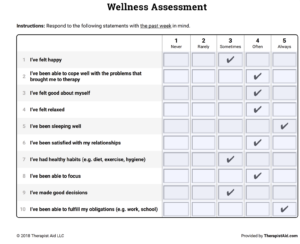January is Mental Health Wellness Month. It is an opportunity to consider our own wellness as well as encourage others to be healthy. Defining mental health wellness is often more complicated than it appears. Due to the tendency to view mental health through a medical lens, we often think that the absence of a diagnosable condition means we are well. However, anyone who is living life in the modern era can attest that the absence of depression does not necessarily mean an individual is happy. Neither does the absence of anxiety or other mental health conditions equate to a life lived to its fullest.
So, what are the ways to consider mental health wellness and how can we incorporate a simple strategy to be mentally healthy and strong into our lives? One way to do that is to consider the dimensions of mental health and assess informally how you have been feeling or behaving over the past week.
One example is this Mental Wellness assessment available from Therapist Aid at: https://www.therapistaid.com/therapy-worksheet/wellness-assessment.

The dimensions of mental wellness include thinking about the last week and the degree to which you felt happy, good about yourself, relaxed, sleeping well, satisfied in relationships, making good decisions, healthy habits, fulfilling your obligations in life, etc.
All human emotions and behavior exist on a continuum and some weeks are better than others for all of us. Using a quick check-in tool such as this to take stock of all the dimensions of your life can illuminate areas where you can improve. If most of your answers are “often” or “always” you are in a healthy place. However, if your answers tend to be in the “never” or “rarely” category, you will find that some opportunities exist to improve your overall wellness.
It might feel overwhelming to tackle improvement in several dimensions but if you can select one or two to work on in the coming weeks, there is a huge benefit to making the effort. Improving one dimension of your life, such as getting adequate sleep and nutrition, can have valuable improvement effects in other dimensions. Start small, make positive changes week by week and your mental wellness will continue to improve, and you will thrive as an individual.
As seen in this example, the individual may want to take some time to think about strategies to improve their healthy habits (item 7) or recent decisions (item 9).
A quick check-in tool is helpful in many ways. It helps us reflect on our past week and set goals for improvement. If you wish to encourage others to consider their wellness, feel free to share this tool. The more you can honestly assess your feelings and behaviors as being healthy, you can face the week confident that you are in a strong place and able to manage the stressors coming your way.

